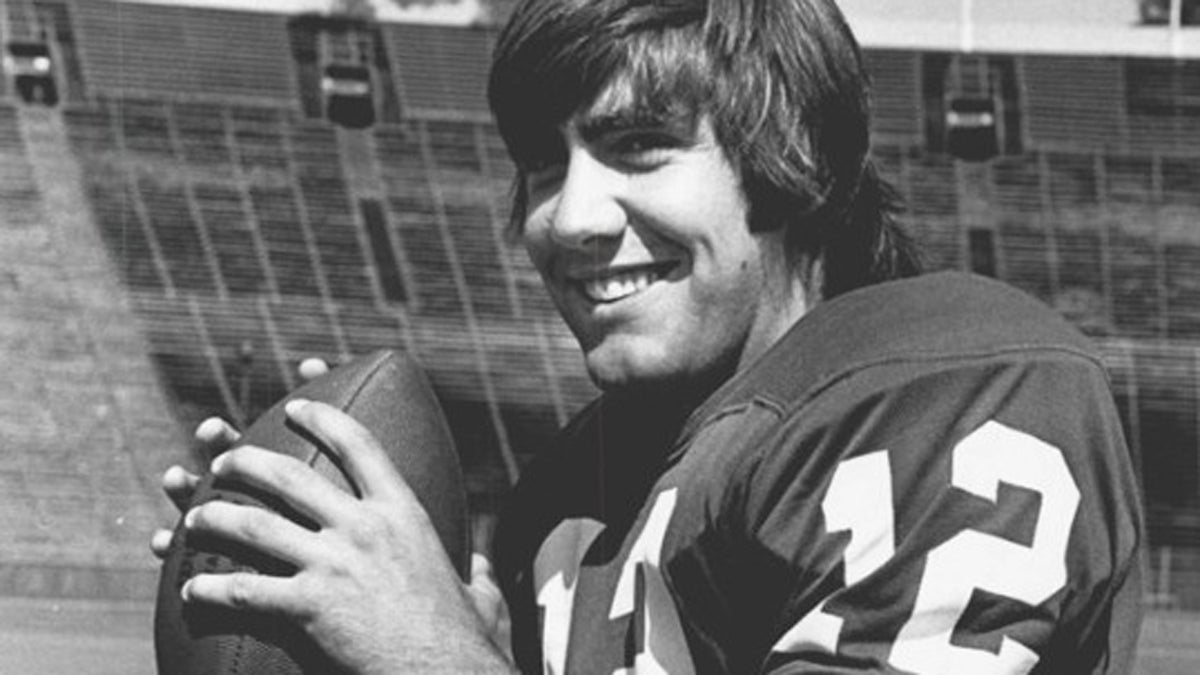Former Eagles quarterback takes his NFL story to the stage
Listen
Mike Boryla
A former Philadelphia Eagles quarterback, who left the NFL 35 years ago, is now looking back from the vantage point of the stage.
Mike Boryla (#10) played with the Eagles from 1974-1976, then very briefly with Tampa Bay, before making the 1977 Pro Bowl squad. Then he abruptly left professional football.
He became a tax lawyer, a mortgage banker, and raised four boys. All the while, he never talked about his time on the gridiron. Boryla did not appear in any football documentaries, attend football tributes, or allow himself to be interviewed for highlight reels. The game was dead to him.
“My oldest son was getting older, and he was starting to ask me about it,” said Boryla. The questions grew more intense in 2006, with the release of the film “Invincible,” about the 1976 Eagles starring Mark Wahlberg. “They have pictures of me getting sacked – they used video of me. [My son] asked, ‘Dad, why did you quit so early?'”
The answer to that question comes in “The Disappearing Quarterback,” a 75-minute one-man show opening this weekend at Plays and Players Theater, in Rittenhouse Square. It is, by turns, an open love letter to football and its players, and a scathing cautionary tale about how the game brutalizes men.
“As I’ve been working on this show, it’s been a little harder to watch,” said Daniel Student, who is directing Boryla in “The Disappearing Quarterback.” He grew up in Baltimore as a Ravens fan. “I went away from watching football for the first half of the season, and as the season progressed, I started watching and getting back to being a fan again, but I guess you could say watching with open eyes.”
Two years ago, Boryla, who lives in Denver, cold-called Student to ask if he would be interested in a script he had just written – a musical comedy called “Eagles Belong Where They Can Fly.” It had a full cast of characters and eight songs.
The first thing Student did was Google “Mike Boryla,” to find out if this guy on the phone was legit. Then he read the script – it did not blow him away, but there were nuggets of brilliance.
“There were these little paragraphs that he gave to a narrator that seemed to be personal stories, the kind of thing you couldn’t make up about his life in football,” said Student. “I said to myself, ‘If somebody like Mike Boryla wants to use theater as their method of exploring their life, this is something you have to jump on.’ Theater is desperate for fresh voices.”
Student kept a lot of material in about Boryla having his ankles taped in the locker room before games, players daring each other to eat glass, and babysitting new recruits at Stanford, but he cut out all the characters and songs, re-imagining the musical comedy as a first-person monologue.
An uncomfortable fit
At 6’2″ with hands that could palm a watermelon, Boryla was a natural quarterback at Stanford University, then with the Eagles, but he never felt entirely comfortable with football.
In the play, Boryla recalls an episode when a bunch of star players were flown to Chicago for a photo session at the Playboy Club. Just as the party heated up, Boryla made a quick exit.
“I took a cab back to the hotel, and I spent the rest of the evening studying the book of Isaiah, alone, in my hotel room,” says Boryla, holding a Bible onstage. “That’s how I pretty much made it through pro football.”
Boryla used his faith to navigate his professional football career, and it was his faith that caused him to leave.
“The reason I left was because I thought the Lord was telling me to leave and not look back,” he said. “That is why I left.”
Nagging health concerns
There was another nagging worry: his health. Boryla suffered three serious concussions playing football.
“They called a concussion, getting “dinged.”
“Dinged” is the word they used,” said Boryla. “I remember the coach saying, ‘Mike, it’s no big deal, you just got dinged.'”
Over the past 35 years, Boryla has seen his former teammates and rivals topple from long-term injuries: chronic traumatic encephalopathy (CTE), Lou Gehrig’s disease (ALS), painful hip and knee conditions. Some of them require 12 hours of medical care seven days a week.
Boryla was not part of the recent lawsuit many former players brought against the National Football League to address health concerns from years of play. He does not suffer serious sustained injuries. But Boryla’s five years with the NFL will always be with him.
“The show is on the third floor of our theater, and we’re in an historic, 102-year old building without an elevator,” said Student. “So the man walks up and down the steps. You can see it when he walks up and down the steps.”
A recent study by Harvard University shows the average life span of an NFL player is 55 years. Boryla is now 62.
“I am the primary caretaker of my son with Downs Syndrome. I’ve been actively involved with the raising of our four sons,” said Boryla. “If I had been brutalized by pro football like so many quaterbacks are, I wouldn’t be able to raise them. In a lot of cases, some of the guys I played with are dead – and they died 10 years ago.”
His play, “The Disappearing Quarterback,” opens this weekend. During its run, some of Boryla’s former Eagles teammates – Charlie Young and Kevin Reilly – will attend a post-performance talk.
WHYY is your source for fact-based, in-depth journalism and information. As a nonprofit organization, we rely on financial support from readers like you. Please give today.




